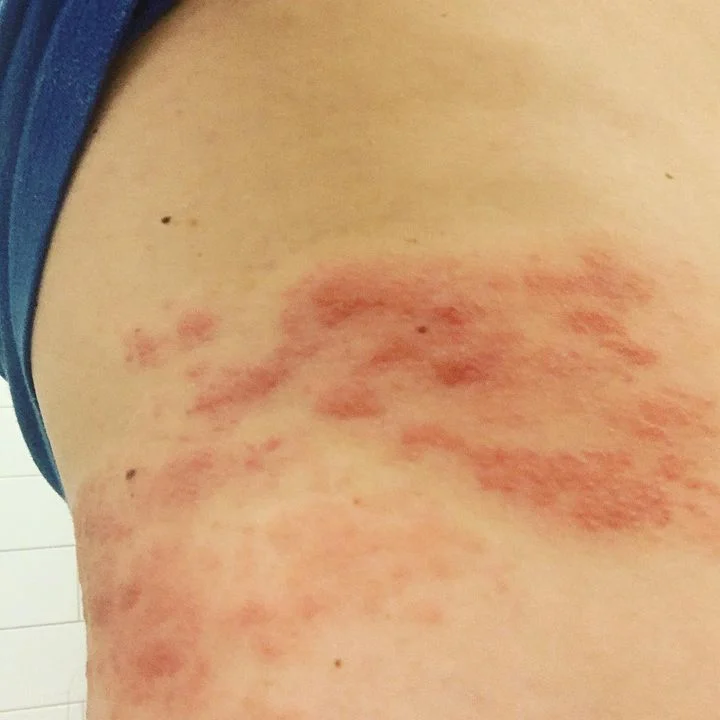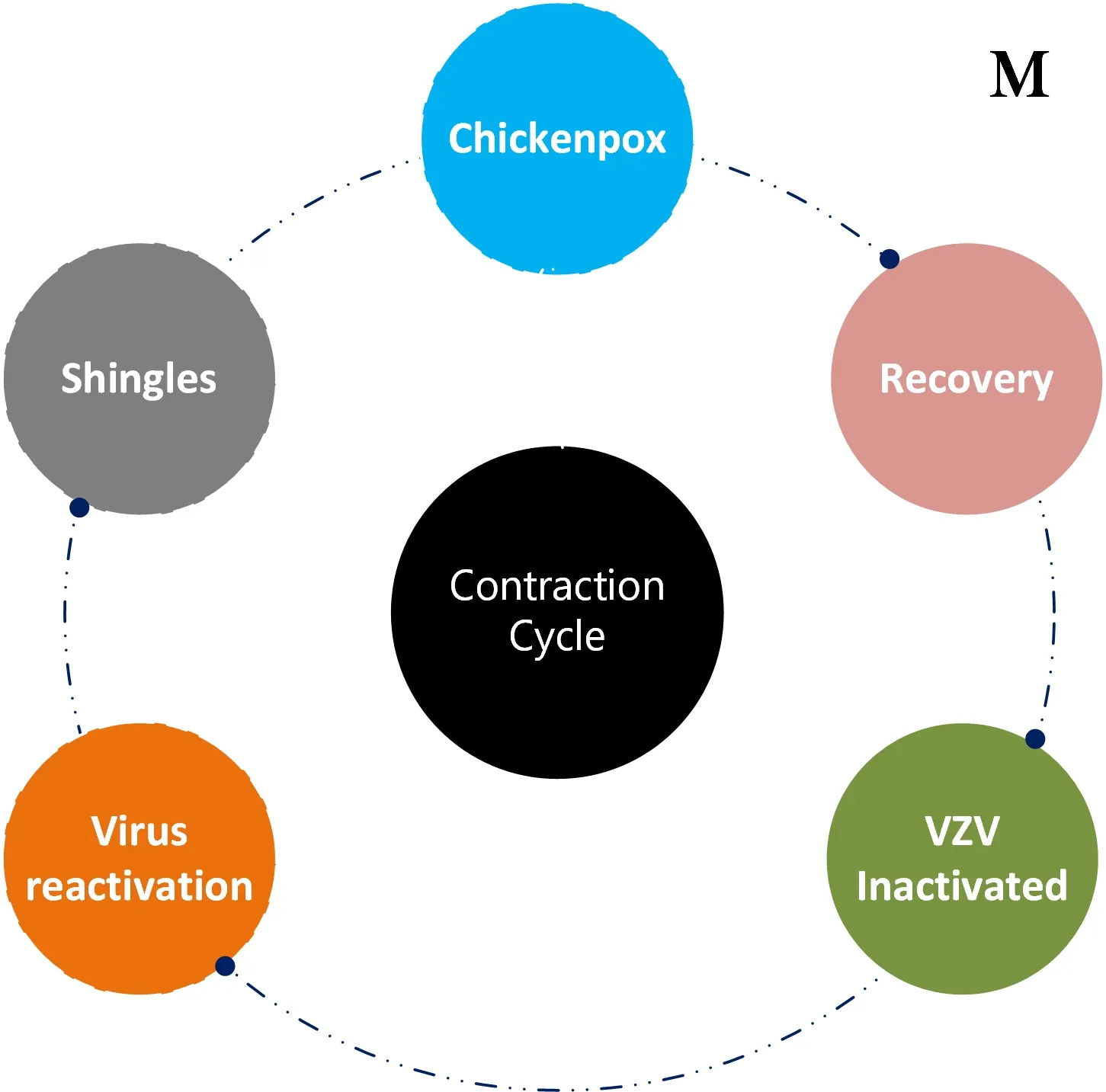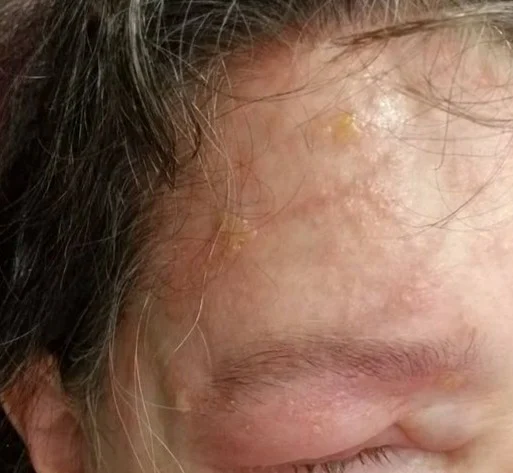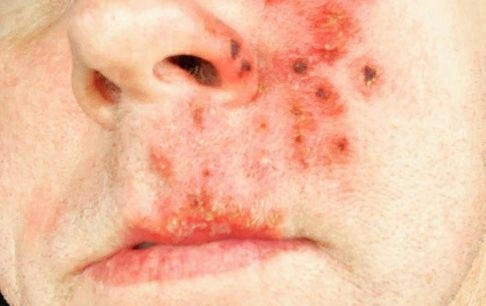Summary :
◉ What is Shingles ?
Shingles is a painful rash caused by the varicella-zoster virus (VZV virus), which also causes Chickenpox.
Most people have chickenpox in childhood, but after the disease clears, the VZV virus remains dormant (inactive) in the nervous system. The immune system controls the virus, but later in life it can reappear as shingles.
The first sign of Shingles is often a burning or tingling sensation. After several days, a rash usually appears as a band of fluid-filled blisters on one side of the body, usually on the chest, neck, or face.
It is generally a benign infection and easy clinical diagnosis. However, serious forms and complications, which involve the vital and functional prognosis, can occur in particular in the immunocompromised.

Shingles
Early treatment can shorten the duration of the infection and reduce the risk of complications.
◉ Stages of shingles
Most cases of Shingles last about three to five weeks.
- 1 to 5 days after the tingling or burning sensation on the skin, a red rash will appear.
- A few days later, the rash will turn into blisters
- 10 days later, the blisters dry up and form a scab.
- A few weeks later, the scabs disappear.
◉ Causes
The varicella-zoster virus is a strictly human virus belonging to the Herpesviridia family.
After the primary infection, the VZV virus remains in a latent state in the sensory nerve ganglia. This may not cause problems for many years. But as the person ages, the virus can reactivate, traveling back down the long nerve fibers that run from the sensory cell bodies to the skin. The viruses multiply, the telltale rash breaks out, and the person now has Shingles.
It is not known exactly why the shingles virus is reactivated later in life, but most cases are thought to be caused by reduced immunity.

◉ Shingles Risk Factors
Anyone who has had chickenpox is at risk of developing Shingles. Factors that may increase your risk of developing Shingles include:
- Advanced age: The risk increases with age. About half of all shingles cases occur in adults 60 years of age or older.
- Diseases that weaken your immune system, such as HIV and cancer, can increase the risk of shingles.
- Immunosuppressive treatments, radiotherapy or chemotherapy can reduce your resistance to diseases and trigger shingles.
- Your immune system may be weaker when you have an infection or are under stress (both physical and emotional stress).
Note :
- Most people only get shingles once. However, it is possible to have it more than once.
◉ Is Shingles contagious ?
You can't get Shingles from someone who has Shingles, but you can get Chickenpox.
Direct contact with fluid from a Shingles rash can still spread the varicella zoster virus, which can cause chickenpox in people who have never had chickenpox before or the chickenpox vaccine.
◉ What are the symptoms of Shingles ?
Usually, Shingles is unilateral, the infection develops on only one side of the body or face and in a small area. The most common place where Shingles occurs is a band, called a dermatoma, that runs down one side of the trunk around the waist.
Before the rash appears, people often feel pain, itching, or tingling in the area where it will develop. This may occur several days before the rash appears.
Most people with shingles have one or more of the following symptoms:
- A red rash that begins a few days after the pain.
- Fluid-filled blisters that break open and form a crust.
- Burning, tingling, itching, shooting pain or numbness of the skin.
- Touch sensitivity.
- Chills, fever, fatigue, headache or stomach pain.
Note :
- The rash does not always appear red. Depending on skin tone, the rash may appear dark pink, dark brown, or purplish.
- The pain can be intense. Depending on where the pain is located, it can sometimes be confused with heart, lung or kidney problems.
- Some people experience the pain of Shingles without ever developing the rash.
◉ Ophthalmic Shingles
For some people, Shingles occurs in and around the eye. You may experience symptoms such as:
- A rash may appear on your eyelids, forehead, and sometimes the tip or side of your nose
- Burning or throbbing in the eye
- Redness and tearing
- Swelling
- Blurry vision

Ophthalmic Shingles
If you notice blisters on your eye, see your doctor immediately as this is an urgent issue. Without treatment, ophthalmic Shingles can lead to serious problems, including long-term vision loss and permanent scarring from corneal swelling.
◉ Shingles on the face
Shingles can develop on one side of your face. The infection can lead to:
- Weakness in your facial muscles
- Hearing problems
- Difficulty eating, sores lesions can be very painful
- Shingles on the scalp can lead to permanent bald patches.

◉ Long term pain
After the Shingles rash goes away, some people may experience persistent pain called postherpetic neuralgia. The pain is felt in the area where the rash has occurred. The older you are when you have Shingles, the more likely you are to develop postherpetic neuralgia.